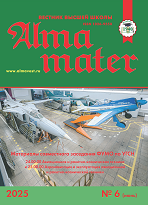https://doi.org/10.20339/AM.02-19.061
T.A. Naumova is Cand.Sci. (Psychology), doc. e-mail: nta64@yandex.ru ; E.V. Neborsky is Cand.Sci. (Pedagogy), doc. e-mail: neborskiy@list.ru ; N.I. Vitovtova is Cand.Sci. (Jurisprudence), doc. e-mail: n@jf.uni.udm.ru at Udmurt State University; and A.E. Shklyaev is Dr.Sci. (Medicine), doc., vice-rector e-mail: shklyaevaleksey@gmail.com at Izhevsk State Medical Academy
Presented is research of distance learning as a means of teaching students with special educational needs and as result of providing with admittance of higher education for all categories of citizens. The target group of the study was students with disabilities, studying remotely, without attendance in classroom (at the time of the study, this form of education did not violate requirements of educational standards). Students of training course “Jurisprudence” of Udmurt state university (city of Izhevsk), who studied remotely and agreed to participate in the study, took part in the experiment. As a result of the research, psychological and pedagogical characteristics of studied group of students were revealed, forms and methods of teaching students with disabilities were revealed and approbated. Also elaborated are recommendations for development of distance learning modules.
Key words: higher education, distance learning, students with special educational needs, pedagogical technology, active learning methods.
References
- Naumova, T.A., Vytovtova, N.I., Baranov, A.A. Pedagogical technology of distant professional education of persons with special pedagogical needs. Modern problems of science and education. 2015. No. 5. P. 378.
- Naumova, T.A., Vytovtova, N.I., Miyiukov, N.W., Zulfugarzade, T.E. Model of distant learning educational methods for the students with disabilities. European Journal of Contemporary Education. 2017. No. 6–3 (3). P. 565–573.
- Beckle, S. HE alliance to pilot MOOC credit transfer system. URL: https://thepienews.com/news/he-alliance-to-pilot-mooc-credit-transfer-sy...
- Bjekić, D., Obradović, S., Vučetić, M., Bojović, M. E-teacher in Inclusive e-education for Students with Specific Learning Disabilities. Social and Behavioral Sciences. 2014. Vol. 128. P. 128–133.
- Boguslavsky, M.V., Neborsky, Yu.V. Development of the university education in the context of globalization. URL: http://www.shsconferences.org/articles/shsconf/abs/2016/07/shsconf_eeia2...
- Braus, J. Environmental education in the schools: Creating a program that works. Michigan, 1994.
- Crawford, A., Saul, W., Mathews, S.R. Teaching and learning strategies for the thinking classroom. New York, 2005.
- Kaplan, A.M., Haenlein, M. Higher education and the digital revolution: About MOOCs, SPOCs, social media, and the Cookie Monster. Business Horizons. 2016. Vol. 59. Iss. 4. P. 441–450.
- Manca, S., Ranieri, M. Facebook and the others. Potentials and obstacles of Social Media for teaching in higher education. Computers & Education. 2016. Vol. 95. P. 216–230.
- Pope, J. What are MOOCs good for? URL: https://www.technologyreview.com/s/533406/what-are-moocs-good-for/
- Roberts, J.B., Crittenden, L.A., Crittenden, J.C. Students with disabilities and online learning: A cross-institutional study of perceived satisfaction with accessibility compliance and services. The Internet and Higher Education. 2011. Vol. 14. Iss. 4. P. 242–250.
- Xu, D., Jaggars, Sh. S. Online and Hybrid Course Enrollment and Performance in Washington State Community and Technical Colleges. CCRC Working paper. 2011. No. 31.











.png)






